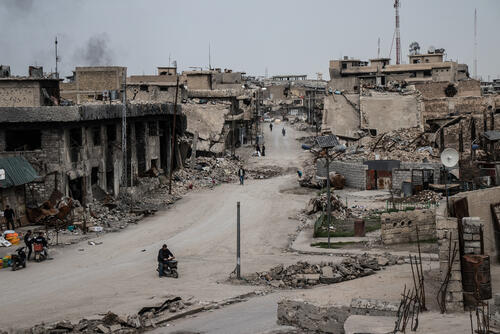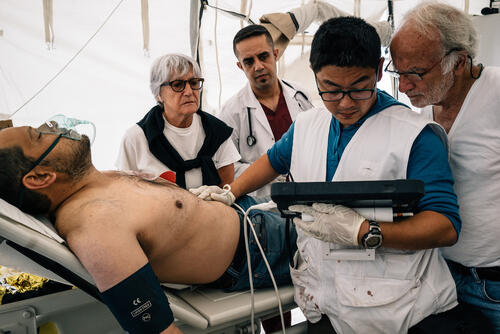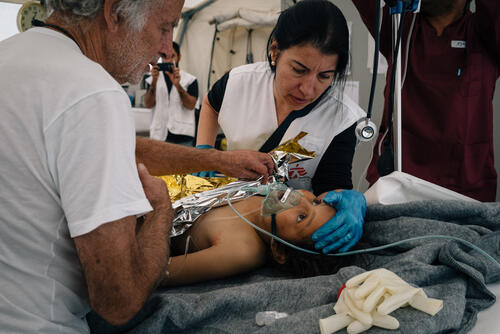
42,600
42,6
6,200
6,2
4,600
4,6

2,500
2,5
Although the conflict subsided in late 2017, humanitarian needs in Iraq remain extremely high. More than 2.9 million people have still not been able to return to their homes.
MSF significantly stepped up its response in Iraq, providing trauma care and emergency surgery for war-wounded people. MSF teams also delivered basic healthcare, nutrition programmes, maternal health services, treatment for chronic diseases and mental health support for displaced people and others affected by the violence.
Ninewa governorate
Mosul
In the battle to recapture Mosul, frontlines cut through residential areas, which meant that many people were living under siege and bombardment, for months in some areas. Many of those injured had to wait for days or weeks before they could safely leave their homes, and in most cases only the walking-wounded were able to safely reach a clinic or hospital.
MSF was part of a major emergency response in and around Mosul. After an assessment of risks to patients and staff, MSF positioned several trauma stabilisation posts close to the frontlines, where teams stabilised wounded patients before referring them to other medical facilities.
In east Mosul, MSF ran four projects in hospitals offering a range of services including emergency and intensive care, surgery and maternal healthcare, as well as inpatient and outpatient therapeutic feeding centres for children. All four projects have now closed.
In June, as the violence escalated in west Mosul, MSF opened a hospital to treat trauma patients. In addition to an inpatient department and emergency room, it has a maternity unit. When the number of war-related trauma cases decreased, MSF expanded its maternity, newborn and paediatric care activities in the facility.
Hamam al-Alil
MSF ran an emergency trauma surgery hospital in Hamam al-Alil, 30 kilometres south of Mosul, until July 2017. More than half of the trauma patients from the battle for west Mosul passed through this hospital. MSF also set up a primary healthcare centre in the town.
Al-Hamdaniya
MSF set up a 40-bed hospital department with Handicap International in Al-Hamdaniya, southeast of Mosul, to provide post-operative care and rehabilitation for people who had received emergency lifesaving surgery on or behind the frontlines. Many patients needed secondary amputations, wound cleaning and major internal surgery.
Camps for displaced people
During the battle for Mosul, thousands of people fled the city, seeking shelter in camps in Ninewa and Erbil governorates. MSF operated in 16 locations, providing primary healthcare, treatment for non-communicable diseases (NCDs), such as diabetes and hypertension, and mental health support, including psychosocial counselling and child therapy.
Zummar
MSF ran a maternity clinic with a paediatric unit in Tal Maraq village, which was in a disputed area of Iraq with limited access to healthcare. The clinic offers ante- and postnatal consultations and basic emergency obstetric care. General healthcare consultations, mental health services and treatment for NCDs were also available via mobile clinics deployed to surrounding villages.
Qayyarah
MSF’s field hospital in Qayyarah operated at full capacity, providing surgery, emergency and inpatient care, paediatrics, nutrition and mental health support. In June, teams started seeing and treating an increased number of babies who were severely malnourished. In July, an integrated nutrition and mental health project was launched in camps close to Qayyarah. The project treats children under the age of five for acute malnutrition.

Kirkuk governorate
Throughout 2017, people fled Hawija district, often travelling at night on foot with little food and water. MSF’s mobile teams were located at key points to offer assistance. In January, MSF also started providing basic healthcare, emergency referrals, NCD treatment and mental health consultations in Daquq camp. In addition, MSF donated supplies and trained staff in the emergency rooms of the two main hospitals in Kirkuk city.
Dohuk governorate
After more than four years of operations, MSF handed over its sexual and reproductive health and maternity project in Domiz Syrian refugee camp to the Dohuk Directorate of Health in November.
Sulaymaniyah governorate
MSF expanded its project in Sulaymaniyah to support the huge influx of displaced people, setting up health promotion and mental health activities, including individual and group counselling sessions, in Arbat camp.
MSF also supported Sulaymaniyah emergency hospital to improve standards of care and infection prevention and control, by training staff and refurbishing the emergency room and intensive care unit. The project finished in November.
Diyala governorate
In Jalawla and Sadiya, MSF provides treatment for NCDs, mental health support and sexual and reproductive healthcare for families returning to the area. In 2017, MSF assisted with the rehabilitation of the towns’ primary healthcare centres and Jalawla hospital. Teams also provided NCD and mental health services in two camps for displaced people.

Anbar governorate
MSF teams provided primary healthcare, NCD follow-up and mental health services in Amriyat Al Fallujah and Habbaniya Tourist City camps. MSF closed its primary healthcare clinic in Kilo 18 camp when the number of people in the camp fell.
MSF completed its support of Al Fallujah teaching maternity hospital in Anbar, having rehabilitated the emergency room, upgraded the operating theatre, improved waste management and trained nursing staff.
MSF prepared a new mental health unit in Ramadi teaching hospital, which will open in early 2018. The unit will offer specialised care to patients with moderate and severe mental health disorders.
Salahedin governorate
As military operations expanded in northwestern Iraq, thousands of civilians fled to relatively safer areas in Salahedin. To respond to the growing needs, MSF ran mobile clinics in the city of Tikrit, offering outpatient and mental health consultations, and set up a primary healthcare centre in one of the camps.
Babel governorate
In a new project to upgrade Ibn Saif paediatric hospital in Musayib, MSF rehabilitated the wards and warehouse, and constructed a pharmacy. The team trained medical and paramedical personnel, established infection and waste management protocols, and donated more than 30 tonnes of medicines and equipment. MSF also set up a psychosocial unit for inpatients and the community. The project was handed over to the Directorate of Health in December.
Baghdad governorate
In August, MSF opened a rehabilitation centre with a 20-bed inpatient department in Baghdad, to provide physiotherapy, pain management and psychological support to civilian victims of war.
Teams also worked in a mobile unit in Abu Ghraib district, offering medical and mental healthcare to displaced people, and in a primary healthcare clinic in the Al Shuhada II area.


















